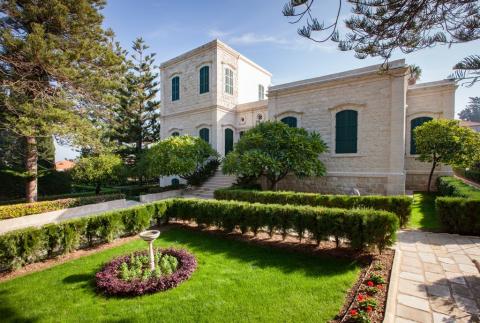The Master considered cleanliness of vital importance. He was indeed ‘the essence of cleanliness’ even as Bahá’u’lláh had taught His followers. Florence Khánum bore witness to this, for she found Him ‘dazzlingly, spotlessly shining, from snowy turban-cloth, to white, snowy hair falling upon his shoulders, to white snowy beard and long snowy garment Although it was high noon, in summer His attire was crisp and fresh-looking, as though He had not been visiting the sick, and in prison, and toiling for mankind since early morning. Often a deliciously fresh rose was tucked in His belt. (
Cleanliness
While ‘Abdu’l-Bahá was walking in the rose-garden he passed by Hájí Mullah Abou Taleb, the very old man with stooped shoulders and long beard. He looked at him, then at others, and smiled. “Hájí Mullah Abou Taleb is my friend,” [he said]. “He looked just as old forty years ago when he came to this blessed spot for the first time. Now he has come never to leave. Are you well and happy? How can you descend and ascend the mountain every day?” Then he came very near to him and looked at his thin and probably soiled overcoat. “Hast thou not received thy new overcoat? I have brought one for thee. I will send it up for thee. Man must keep his clothes always clean and spotless.” He answered: “I am not particular about my outward clothes, but the robe of the virtue of God is necessary for us.” Immediately ‘Abdu’l-Bahá’s face lighted up: “Thou art right, the believers of God must ever strive to clothe their spiritual bodies with the garment of the virtue of God, the robe of the fear of God, and the vesture of the love of God. These robes will never become threadbare. They will never be out of fashion. Their market values do not fluctuate. They are always negotiable and ever on demand. They are the means of the adornment of the temple of man and woman. But the outward raiment must be also clean and immaculate, so that the outer may be a fair expression of the inner. Cleanliness is one of the fundamental laws of this religion.
He added that one should wear black only as a convenience, because it does not soil easily.
Not only His person but also His immediate surroundings needed to be spotless. Once when He had guests whom He would always honour He asked that the chimney of a lamp be replaced as it was not sufficiently polished.
He said, `I have not had a good bath for several months.’ The ship’s attendant was then asked to prepare a warm fresh water bath for Him. Afterwards, He said, `I am much better now. For a long time I have not had leisure to take a real bath.’
